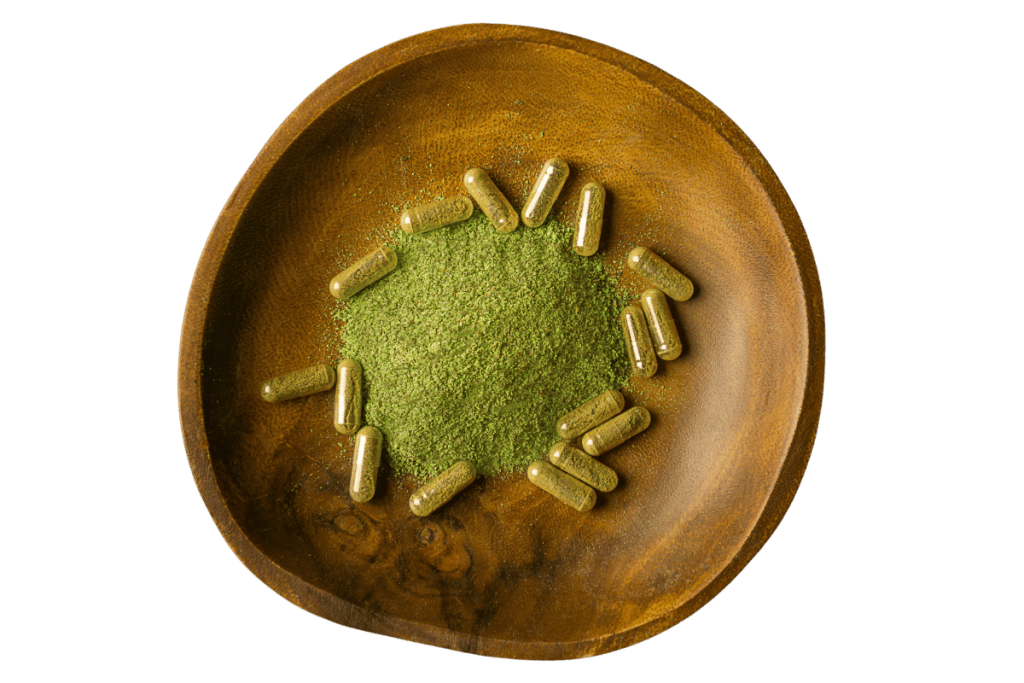Kratom doesn’t seem to be outright banned, but it’s not worth the risk.
There isn’t much information available about kratom (Mitragyna speciosa) in Saudi Arabia, and it doesn’t seem to be on its list of controlled substances. However, drinking alcohol is highly illegal and has strict punishments.
It looks like there’s one online store based in Saudi Arabia that sells kratom, and it only has Bali capsules. Still, the country, as a whole, takes a very harsh view of using any drug (natural or otherwise).
Here’s a look at the punishments for alcohol and drug use, so you can decide if it’s worth the risk or not.
Kratom Legality in Saudi Arabia & Elsewhere
Even if kratom isn’t technically illegal in Saudi Arabia, it’s tough to find. Plus, some of the harshest penalties levied against drug users have occurred by the Saudi government; therefore, it’s best not to try.
Traveling through Saudi Arabia with kratom is also not recommended. Doing so will likely make you look like a drug smuggler and could lead to serious legal consequences, including death.
Saudi Laws on Drugs & Alcohol
Saudi Arabia bases its laws and punishments on Sharia Law. Under Islamic law, alcohol consumption is a Hudud crime and comes with a fixed penalty, often a physical punishment like flogging, though the number of lashes is up for debate [1].
According to the General Director of Narcotics Control, Royal Order No. 4/B/966 states that smuggling drugs into Saudi Arabia deserves the most severe punishment. First-time offenders can be imprisoned, face lashings, or fined — sometimes all three. Repeat offenders can face death.
Drug users are imprisoned for two years but might face other punishments based on the judge’s discretion. Students — defined as anyone under 20 and enrolled in school — are excluded from these punishments if they meet certain criteria. These include not resisting arrest, no prior drug convictions, and not smuggling drugs. The student won’t face more than three months of jail time or more than fifty lashes if the guardians commit to guiding them.
Considering Saudi Arabia’s harsh stance on drugs and alcohol, it likely won’t look favorably on kratom, either.
Kratom Laws Around the World
Other countries — and even some US states — have said they’ve banned kratom due to public health interests. These nations include Poland, Romania, Australia, the UK, and Denmark. It’s not entirely clear that this is the real reason for making kratom illegal. Many people interested in kratom say it’s to protect pharmaceutical companies instead.
There are some places where you can legally obtain kratom, including Canada and most of the US. Sadly, people are also working to make kratom illegal in these countries.
Kratom was introduced to the world via Thailand, Malaysia, and Indonesia. These countries have most of the world’s supply, but even they’ve been hesitant to embrace it fully.

For instance, Thailand banned the Mitragyna speciosa in 1943, followed by outright banning kratom in 1979. Did Thailand’s interest in controlling the opium market have anything to do with the ban? We can’t know for certain, but many people believe this.
The good news is that the government finally saw the light or gave in. As of 2018, kratom is legal in Thailand.
Malaysia has also tried to ban kratom, but the law doesn’t seem to have caught on. Indonesia has signaled a very real threat to kratom. The nation plans to ban it in 2024, which would throw the global market into disarray. Hopefully, Indonesia will back down before 2024 gets here.
Suggested Reading: Kratom Myths & Misinformation
Can I Buy Kratom in Saudi Arabia?
We could only find one vendor in Saudi Arabia that sells kratom. Are there others? Possibly, but again, the laws don’t seem favorable to its use, and you might be playing a dangerous game.
It isn’t easy to know if the one visible vendor, Middle East Chemicals (via Exporters India), is selling kratom legally or not. They only have one style of kratom: Bali capsules. There isn’t any pricing available without reaching out to the vendor directly.

It looks pretty likely that Middle East Chemicals has adopted a “don’t ask, don’t tell” policy regarding their kratom. They may also be selling it solely to customers outside of Saudi Arabia. We can’t tell, and you have to contact them to ask questions.
Kratom may be available in Saudi Arabia via illicit traders or the black market. The reality, however, is that most people in Saudi Arabia don’t seem to know what kratom is.
Getting kratom sent to Saudi Arabia could land you in serious trouble. Despite it not being listed on Saudi Arabia’s Controlled Substance list, this isn’t the place to mess around with potentially illegal things.
Why is Kratom (Possibly) Banned in Saudi Arabia (& Other Countries)?
All alcohol and drug offenses are illegal in Saudi Arabia. Kratom isn’t technically a drug, but it’s probably viewed through the same lens.
In Saudi Arabia, it’s considered a crime against God to use drugs or alcohol.
To put this into context, using marijuana in Saudi Arabia is punished by up to 6 months imprisonment and whippings, and that’s just for a first offense. Drug dealing carries a prison sentence of up to 10 years and whippings. In some rare instances, drug dealers are even put to death.
Some other countries may have made kratom illegal, but their laws don’t come with the possibility of being whipped. Therefore, it’s likely that the world’s harshest penalty for kratom comes from Saudi Arabia or other Islamic countries with similar laws.
Most countries don’t operate under Sharia law and therefore have different motives for banning kratom, usually stating public health interests due to its opiate-like tendencies.
Suggested Reading: How Long Does Kratom Stay in the System?
Known Side Effects of Kratom
So, is kratom a threat to society? Kratom can be addictive, but it’s nowhere near as addictive or dangerous as prescription opioids [2]. It is relatively safe and helps alleviate chronic pain, anxiety, depression, and insomnia and can provide energy and focus.
There are side effects, but these are minimal and don’t tend to be long-lasting. People who use less than 12 grams have a minimal risk of side effects.
Some of the most common side effects of kratom are:
- Anxiety or nervousness
- Headaches
- Stomach pain
- Constipation
- Diarrhea
- Sedation
- Lethargy
- Dizziness
- Nausea or vomiting
- Change in hormone profiles
- Long-term abuse could impair liver functions

Kratom Use: A Quick History
Opioid-based painkillers are one of the main reasons kratom has become so popular.
The fact that kratom offers opioid-like properties without the risk of respiratory failure is very notable. Many people use kratom to minimize opioid withdrawal symptoms.
Residents of Southeast Asia have been aware of kratom’s benefits for centuries. They’ve relied on it to treat everything from fever and insomnia to diarrhea.
Kratom Deaths: Can Kratom be Fatal?
However, mixing kratom with another substance (especially opioids) is a different story.
Scientists have found that kratom deaths almost always involve at least one other substance. Using kratom with other drugs is the real danger, not kratom itself. For example, mixing kratom with an opioid has led to several deaths. If you’ve ingested an opioid, your risk of death goes up 1,000 times [3].
Suggested Reading: Is Kratom Dangerous?
How to Take Kratom Safely
Kratom is available in a few different forms. You could use a kratom tincture, brew the powder into tea, or take the powder in capsule form.

When taking kratom, always remember not to mix it with any other substance. Drinking alcohol with it is a bad idea, and it’s also wise to stay off of tobacco while using kratom.
Do NOT mix kratom with painkillers, as those can have an especially bad interaction.
It’s also best to take a break from kratom every so often; this helps avoid addiction and build tolerance.
What is the Correct Dosage for Kratom?
Kratom users should stick between 2 grams and 12 grams.
Taking less than 2 grams is microdosing, which is fine. However, taking more than 12 grams is not recommended.
Your particular physiology impacts how much kratom you can take. We suggest you start with no more than 2 grams, then go up.
Also, remember that kratom is unique in that its effects change based on the amount you take. Small amounts tend to be more energizing, while larger doses are sedating.
The standard dosing guidelines are as follows:
- 2-5 g: Small dose
- 5-10 g: Large dose

Key Takeaway: Is Kratom Legal in Saudi Arabia?
We can’t say kratom is definitely illegal in Saudi Arabia, but we can say that using it there is incredibly risky.
There are many laws in Saudi Arabia, but one seems to outweigh the others. It’s considered a crime against God to take any drugs or alcohol, and this brings harsh penalties.
Ultimately, we wouldn’t take the risk due to the high penalties for using drugs. It’s certainly not going to help chronic pain users to get whipped for using kratom.
- Peiffer, E. (2004). The death penalty in traditional Islamic law and as interpreted in Saudi Arabia and Nigeria. Wm. & Mary J. Women & L., 11, 507.
- Galbis-Reig, D. (2016). A case report of kratom addiction and withdrawal. Wmj, 115(1), 49-52.
- Henningfield, J. E., Grundmann, O., Babin, J. K., Fant, R. V., Wang, D. W., & Cone, E. J. (2019). Risk of death associated with kratom use compared to opioids. Preventive medicine, 128, 105851.









